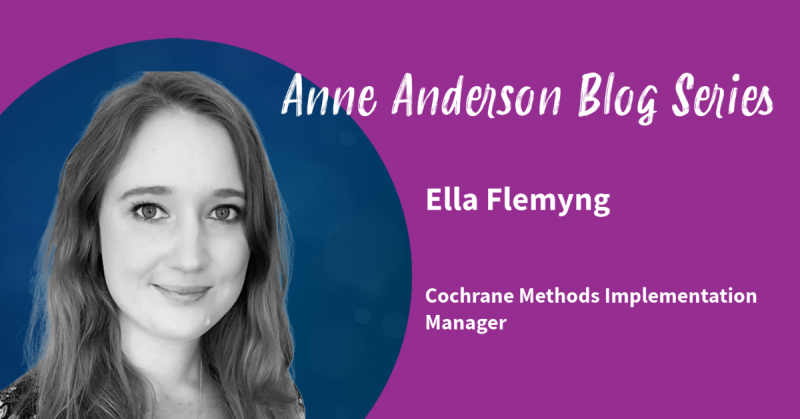
The Annual Anne Anderson Walk is a cherished annual social event in Cochrane, where attendees explore the Colloquium host-city by foot with a guide. Donations by participants are made to next year's Anne Anderson Award. Given current COVID-19 circumstances, the Cochrane community will be not be gathering for the Colloquium in 2021. However, we are holding a Virtual Anne Anderson Walk this year...join us as we share our walks from all over the world!
To accompany this Virtual Anne Anderson Walk, each week we will share blogs from women across Cochrane. Over the coming weeks, we will highlight Cochrane womens' accomplishments, honor their experience, and learn from them, while celebrating the breadth and depth of experience they bring to our global community.

When I started a postgraduate degree in biomedical and molecular science in 2013, I had seen my future in a white lab coat, getting a PhD and working towards some biomedical revelation. However, during this time, I realised the lab wasn’t for me. Given my passion for science, I moved into academic publishing, working for BioMed Central (now known as BMC), which was a pioneer in open access publishing. BMC was committed to open science and pushing boundaries to improve scholarly communication, which resonated with me. My portfolio included methods journals, such as Trials and Systematic Reviews, working closely with the editors and taking their vision for improving how research is planned, conducted and reported, and developing the journals into platforms to facilitate this. These inspirational editors included Douglas Altman, Jeremy Grimshaw, Tianjing Li, David Moher and Lesley Stewart, among many other long-standing Cochranites! The more I worked with them, the more I realised my drive was for improving research reliability, integrity and transparency. I started looking for a role where I could contribute more directly to this, which bought me to Cochrane in early 2019 as Methods Implementation Manager.
What impact has Cochrane had on your career thus far?
The passion for evidence-based healthcare, collaboration and innovation from those who work with Cochrane most definitely rubbed off on me even before I started. My role now enables me to work on projects that aim to improve the quality of Cochrane’s research, including co-leading the implementation of the Risk of Bias 2 (RoB 2) tool and building a more connected methods community to support Cochrane Reviews. Key to my role is working with the community, including Cochrane Methods Groups and Review Groups, to understand the challenges they face and come up with creative solutions to overcome them. And there are some exciting projects underway that I hope to be able to share more information on soon (keep an eye on @CochraneMthds if you are interested)!
Who are some of your role models and/or mentors as you navigate a career in science? What have you learned from them?
Some of my best role models have been my line managers. Two exceptional women come to mind: Rhiannon Meaden (my last manager at BMC) and Kayleigh Kew (my current manager in Cochrane). You cannot underestimate the importance of managers who are allies, who push you to achieve and have your back when you get it wrong (which, at some point, will be inevitable). I’ve always seen it as a kind of Batman and Robin relationship.
What current challenges and opportunities do you see for women in science?
Having the confidence to be yourself and not be concerned about what others think. I’ve found this has got easier with age and life experience. In my 20s, I’d often obsess over things being ‘perfect’ and worry that what I wanted to say would be wrong - ever been at a conference and not asked that question, just in case it sounds stupid? But this goes against the foundation of science, which is about learning and developing. Taking your wellbeing seriously and nurturing self-belief is very important. I’m delighted that Cochrane’s collaborative spirit and inclusive way of working provides a platform for this growth!

